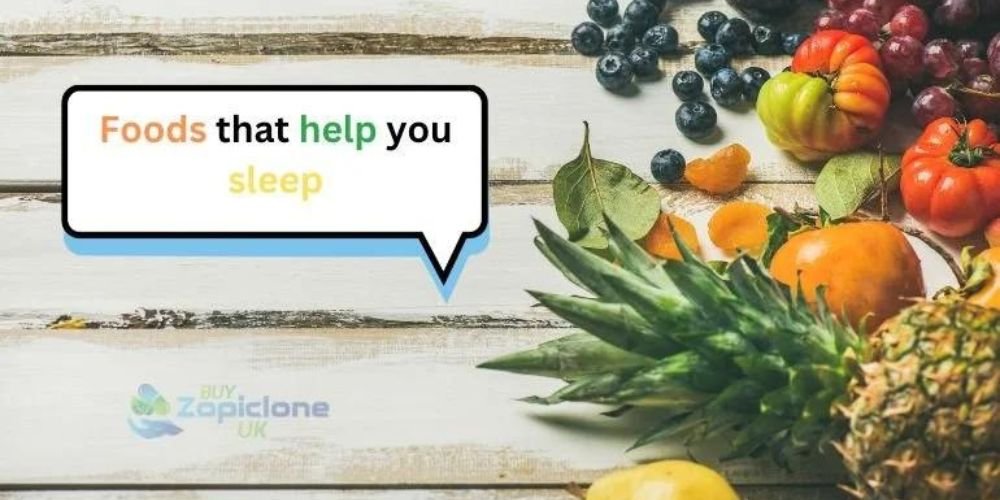Getting a good night’s sleep is essential for our overall health and well-being. It allows our bodies to rest and rejuvenate, helping us to wake up feeling refreshed and ready to take on the day. However, many people struggle with falling asleep or staying asleep throughout the night. One often overlooked factor that can significantly impact our sleep quality is our diet. The foods we eat can have a profound effect on our sleep patterns and the quality of our rest. In this article, we will explore the top 10 foods that can help you sleep like a baby.
Table of Contents
ToggleHow food affects sleep
Before diving into the specific sleep-inducing foods, it’s important to understand how food affects our sleep. Certain foods contain specific nutrients and compounds that can promote relaxation, increase the production of sleep-inducing hormones, and regulate our body’s internal clock. On the other hand, consuming foods that are high in sugar, caffeine, or spicy ingredients can disrupt our sleep patterns and make it difficult to fall asleep.
Foods that help you sleep – introduction
When it comes to foods that help you sleep, there are several factors to consider. These foods are rich in nutrients that support relaxation and sleep, such as tryptophan, melatonin, magnesium, and calcium. Additionally, they have a low potential to cause digestive disturbances or discomfort that could disrupt your sleep. Let’s explore the top 10 foods that can help you sleep fast to achieve a restful night’s sleep.
Food #1: Almonds

Almonds are an excellent source of magnesium, a mineral that plays a crucial role in promoting sleep. Magnesium helps to relax the muscles and calm the mind, making it easier to fall asleep. Additionally, almonds contain protein and healthy fats that can help regulate blood sugar levels throughout the night, preventing any spikes or crashes that may disturb your sleep. Enjoy a small handful of almonds as a bedtime snack or sprinkle them over a salad for a nutritious boost.
Food #2: Turkey
Turkey is well-known for its high tryptophan content. Tryptophan is an essential amino acid that the body converts into serotonin and melatonin, the hormones responsible for regulating sleep. Consuming turkey can promote relaxation and help you fall asleep faster. Whether you choose to enjoy it in a sandwich, as part of a roast dinner, or in a hearty stew, incorporating turkey into your evening meal can contribute to a better night’s sleep.
Food #3: Kiwi

Kiwi is a small but mighty fruit that can aid in sleep quality. This delicious fruit is packed with antioxidants, vitamins, and minerals, including serotonin and folate. Serotonin helps to regulate sleep patterns, while folate helps to promote the production of serotonin. The combination of these nutrients makes kiwi an excellent choice for a bedtime snack. Enjoy a ripe kiwi about an hour before bed to reap its sleep-enhancing benefits.
Food #4: Tart cherries
Tart cherries, or Montmorency cherries, are a natural source of melatonin, the hormone that regulates our sleep-wake cycle. Consuming tart cherry juice or whole cherries can increase the levels of melatonin in our bodies, helping us fall asleep faster and stay asleep longer. Some studies suggest that tart cherry juice may even improve the quality of sleep in individuals with insomnia. Consider adding tart cherries to your evening routine by enjoying a glass of cherry juice or a small bowl of fresh cherries.
Food #5: Warm milk
Warm milk has long been known as a popular bedtime remedy for promoting sleep. This age-old tradition is rooted in science. Milk contains tryptophan, which as mentioned earlier, helps the body produce serotonin and melatonin. Additionally, the warmth of the milk can have a soothing and comforting effect, helping you relax before bed. Sip on a warm mug of milk, whether it’s dairy or a plant-based alternative, to prepare your body and mind for a restful night’s sleep.
Food #6: Bananas
Bananas are not only a delicious and nutritious fruit but also a natural sleep aid. They are rich in potassium and magnesium, two minerals that help relax muscles and promote sleep quality. Bananas also contain vitamin B6, which is necessary for the production of serotonin and melatonin. Snacking on a banana before bed can help regulate your sleep-wake cycle and ensure a peaceful night’s rest.
Food #7: Oatmeal
A warm bowl of oatmeal before bed can be a comforting and sleep-inducing choice. Oats are a complex carbohydrate that helps regulate blood sugar levels, preventing any spikes or crashes that can disrupt your sleep. Additionally, oats are a good source of melatonin, which promotes relaxation and regulates sleep patterns. Add a sprinkle of cinnamon or a drizzle of honey to your oatmeal for added flavour and sleep-enhancing benefits.
Food #8: Spinach
Leafy greens like spinach are a nutritional powerhouse and can also contribute to a good night’s sleep. Spinach is rich in magnesium, a mineral that helps calm the nervous system and relax the muscles. It also contains calcium, another nutrient that plays a role in promoting sleep. Whether you enjoy spinach in a salad, sautéed as a side dish, or blended into a smoothie, incorporating this leafy green into your diet can support healthy sleep patterns.
Food #9: Jasmine rice
Jasmine rice is a fragrant and delicious variety of rice that can aid in better sleep. This type of rice has a high glycemic index, meaning it releases glucose into the bloodstream at a slower rate compared to other types of rice. This slow and steady release of glucose helps regulate blood sugar levels, preventing any sudden drops or spikes that can disrupt sleep. Enjoy a serving of jasmine rice with your evening meal to promote a restful night’s sleep.
Food #10: Herbal tea
Sipping on a warm cup of herbal tea before bed can be a soothing and calming ritual that prepares your body and mind for sleep. Certain herbal teas, such as chamomile, valerian root, lavender, and passionflower, have been used for centuries to promote relaxation and improve sleep quality. These teas contain compounds that have sedative effects, helping you unwind and drift off into a peaceful slumber. Brew a cup of your favourite herbal tea and enjoy it before bedtime for a truly relaxing sleep experience.
Incorporating sleep-inducing foods into your diet
Now that you’re familiar with the top 10 foods that can help you sleep like a baby, it’s time to incorporate them into your diet. Consider adding these foods to your grocery list and plan meals and snacks that include them. For example, you can create a sleep-friendly meal by combining turkey, jasmine rice, and a side of spinach. Or, enjoy a bedtime snack of almond butter spread on a slice of whole-grain toast. Be creative and find ways to include these sleep-inducing foods in your daily meals.
Other tips for better sleep
While incorporating sleep-inducing foods into your diet can significantly improve your sleep quality, there are other lifestyle factors to consider as well. Establishing a consistent sleep routine, creating a calming bedtime environment, managing stress levels, and avoiding electronic devices before bed can all contribute to better sleep. Experiment with different strategies and find a routine that works for you.
Conclusion
Achieving a good night’s sleep is within reach, and one way to support healthy sleep patterns is through the foods we eat. Incorporating sleep-inducing foods such as almonds, turkey, kiwi, tart cherries, warm milk, bananas, oatmeal, spinach, jasmine rice, and herbal tea into your diet can have a positive impact on your sleep quality. Experiment with different combinations and find what works best for you. Remember, a restful night’s sleep is essential for your overall health and well-being. Sweet dreams!
FAQ Foods That Help You Sleep
Which foods make you sleepy?
Bananas: Rich in potassium and magnesium, both minerals known to promote relaxation and muscle tension relief.
Tart cherries: Contain melatonin and anthocyanins, promoting deeper sleep and reducing inflammation.
Oatmeal: Provides complex carbohydrates for sustained energy throughout the night, preventing blood sugar crashes that can disrupt sleep.
Almonds: Contain tryptophan and magnesium, aiding sleep and muscle relaxation.
What foods help stay awake?
Chocolate: Dark chocolate has moderate caffeine and theobromine, another stimulant.
Sugary snacks: Cause blood sugar spikes and crashes, disrupting sleep patterns.
Spicy foods: Can trigger heartburn and indigestion, making it difficult to fall asleep.
Fatty foods: Take longer to digest, causing discomfort and potentially disrupting sleep.
What can I drink to sleep faster?
Warm milk with honey: Honey contains small amounts of melatonin and promotes relaxation.
Tart cherry juice: Concentrated source of melatonin, promoting deeper sleep.
Herbal teas like valerian root or passionflower: These have mild sedative effects but may interact with medications, so consult with a doctor before drinking.
What is the best food to eat to fall asleep?
Can I sleep 30 minutes after eating?
How can I sleep naturally?
How to induce sleep?
What foods to avoid before bed?
How to improve your sleep?
Also Read:





